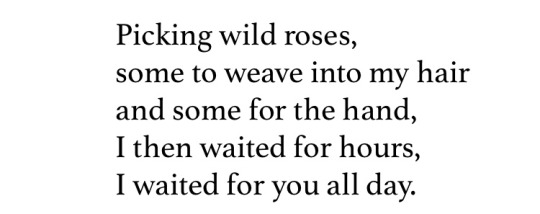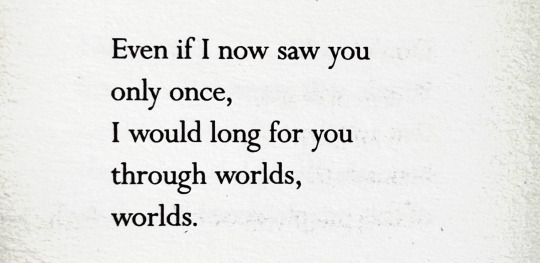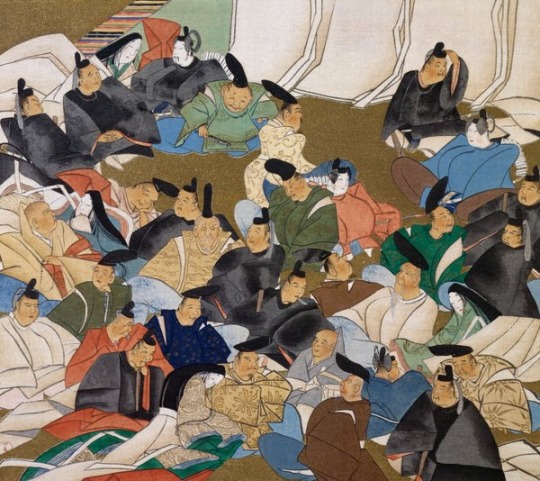#Japanese Poetry
Explore tagged Tumblr posts
Text

Yosano Akiko, tr. by Sam Hamill & Keiko Matsui Gibson, from River of Stars: Selected Poems of Yosano Akiko
[Text ID: “Picking wild roses, / some to weave into my hair / and some for the hand, / I then waited for hours, / I waited for you all day.”]
#yosano akiko#flowers#love#longing#excerpts#writings#literature#poetry#fragments#selections#words#quotes#poetry collection#typography#poetry in translation#japanese literature#japanese poetry
3K notes
·
View notes
Text

The Ink Dark Moon: Love Poems by Ono no Komachi and Izumi Shikibu
#ink dark moon#ono no komachi#izumi shikibu#jane hirshfield#japanese poetry#japanese poem#love poetry#haiku#poetry#love quotes#love#romance#romance quotes#words#quotes#poetry quotes#poems and quotes#love poem#longing
398 notes
·
View notes
Text
When I look at her asleep in the dawn, the body of my lover shines like the lilies in the fields of May.
anonymous Japanese poet
transcribed (and possibly adapted) from a book of early Japanese poetry in the shadowy stacks of Cambridge University Library thirty years ago – any thoughts on a more detailed source would be much appreciated
95 notes
·
View notes
Text
"The moon is beautiful, isn't it?" Japanese novelist "Natsume Soseki" wrote this phrase "the moon is beautiful" to express the love and that's equivalent to "I Love You" in Japanese.
#pls- this is literally so sweet#me when??#i am actually staring at the moon right now#moonlight#full moon#moon#japanese poetry#peoms#literature quotes#natsume soseki#the moon is beautiful#words#spilled words#spilled writing#romanticism
367 notes
·
View notes
Text

強さで繋がっているより
弱さで繋がっていたい
長く細く脆く
一見、すぐに切れてしまいそうな
色のついた糸で
31 notes
·
View notes
Text

Ogura hyakunin isshu (One hundred poets, one hundred poems). 1680.
"This illustrated book of Ogura hyakunin isshu (One hundred poets, one hundred poems) is a collection of one hundred 31-syllable classical Japanese poems (waka), each by a different poet. The collection is organized chronologically from Emperor Tenji (626-671) to Emperor Juntoku (1197-1242). Each of the poets is depicted by a woodblock print created by Hishikawa Moronobu (1618-circa 1694). Morobonu is often considered the first Ukiyo-e artist." Library of Congress
LOC
63 notes
·
View notes
Quote
Not knowing the name of the tree, I stood in the flood of its sweet scent.
Matsuo Bashō
241 notes
·
View notes
Text
冬は海辺で色とりどりの貝殻を拾い、夏は静かに舞い落ちる雪を眺めたいものだ。 In winter, I want to gather colorful seashells on the beach, and in summer, I want to gaze at snow falling softly down to the ground.
#感想#japanese langblr#langblr#learning japanese#japanese language#japanese vocabulary#japan#poetry#japanese poetry#quotes#japanese quotes#literature#linguistics#original#writing#creative writing#feelings#winter#november#snow#light academia#dark academia#studyblr#study aesthetic#study motivation#study blog#studyspo#original poem#poems on tumblr#winter poetry
97 notes
·
View notes
Text
This thing called universal gravitation / Is the power of loneliness pulling together. --Shuntarō Tanikawa (b. 1931)
#personal#quote#quotes#Shuntarō Tanikawa#poetry#Japanese poetry#Japanese literature#20th century poetry#20th century literature
36 notes
·
View notes
Text

The distant village lost in evening mist when I make my way home to my lodge where cedars stand Ngôi làng ở nơi xa sương chiều hôm khuất mất khi tôi trở về nhà nơi có những cây tuyết tùng - Ryōkan Taigu
English Translation: Burton Watson Dịch Việt: Bạt Xứ Art: Yokoyama Taikan
#tanka#japanese art#japanese poetry#short poem#aesthetic#japan#writing#painting#creative#poetry#poem#literature#japanese#spirituality#japaneseart#zen#shortpoem#japanesepoetry#tho#thiền
13 notes
·
View notes
Text

Death is closer than you think. Trace my throat with your fingertip. I am not faking a fever. Sweat collects between my clavicles. I cannot fathom dying before your embrace. So, please—.
09/09 : Nine Japanese Female Poets / Nine Heian Waka by Naoko Fujimoto
#poetry#poems#japanese poetry#Nine Japanese Female Poets Nine Heian Waka#Naoko Fujimoto#my collection#man. MAN. okay.
13 notes
·
View notes
Text

Yosano Akiko, tr. by Sam Hamill & Keiko Matsui Gibson, from River of Stars: Selected Poems of Yosano Akiko
[Text ID: “I want, suddenly, to suck / your feverish lips with mine.”]
#yosano akiko#love#excerpts#writings#literature#poetry#fragments#selections#words#quotes#poetry collection#typography#poetry in translation#japanese literature#japanese poetry
1K notes
·
View notes
Text

The Ink Dark Moon: Love Poems by Ono no Komachi and Izumi Shikibu
#ink dark moon#ono no komachi#izumi shikibu#jane hirshfield#japanese poem#japanese poetry#love poetry#love poem#haiku#japan#poetry#poems#beautiful words#words words words#poems and quotes#quotes#romance quotes#love quotes#words#literature#love
147 notes
·
View notes
Text

Ogata Korin
36 poets
Edo period
#ogata korin#japanese art#japanese artist#japanese painter#japanese painting#asian art#rinpa#rinpa school#rimpa#rimpa school#poets#poetry#japanese poetry#art on tumblr#portrait#group portrait#art history#aesthetictumblr#tumblraesthetic#tumblrpic#tumblrpictures#tumblr art#aesthetic#beauty
33 notes
·
View notes
Text
“Japanese Poetry”, from the series The Six Arts in Fashionable Guise de
Chōbunsai Eishi 鳥文斎栄之
1756 - 1829
aussi connu sous le nom de Hosoda Eishi.



#Chōbunsai Eishi 鳥文斎栄之#japanese poetry#artist painter#art#original art#japanese artist painter#woodblock print#styl japan art#art japanese#huyiro raiko#shukiso suang#sai aeko#xpuigc#xpuigc bloc
11 notes
·
View notes
Text









美しい夕暮れに妻と散歩した。茜に染まる西の空、月、白粉花の香り、風、水の流れ、鳥たちの囀り、全てが調和して、遥かなる影を大地に刻み、輝いていた。妻の話を聴きながら、歩みに合わせる。恋う気持ちが愛になり、祈りになり、空へ届き、光になる。宙の底でぼんやり光り、やがていつか消える時が来ても、想いは繋がり、何処かで誰かの足元を照らす灯りになる。
21 notes
·
View notes